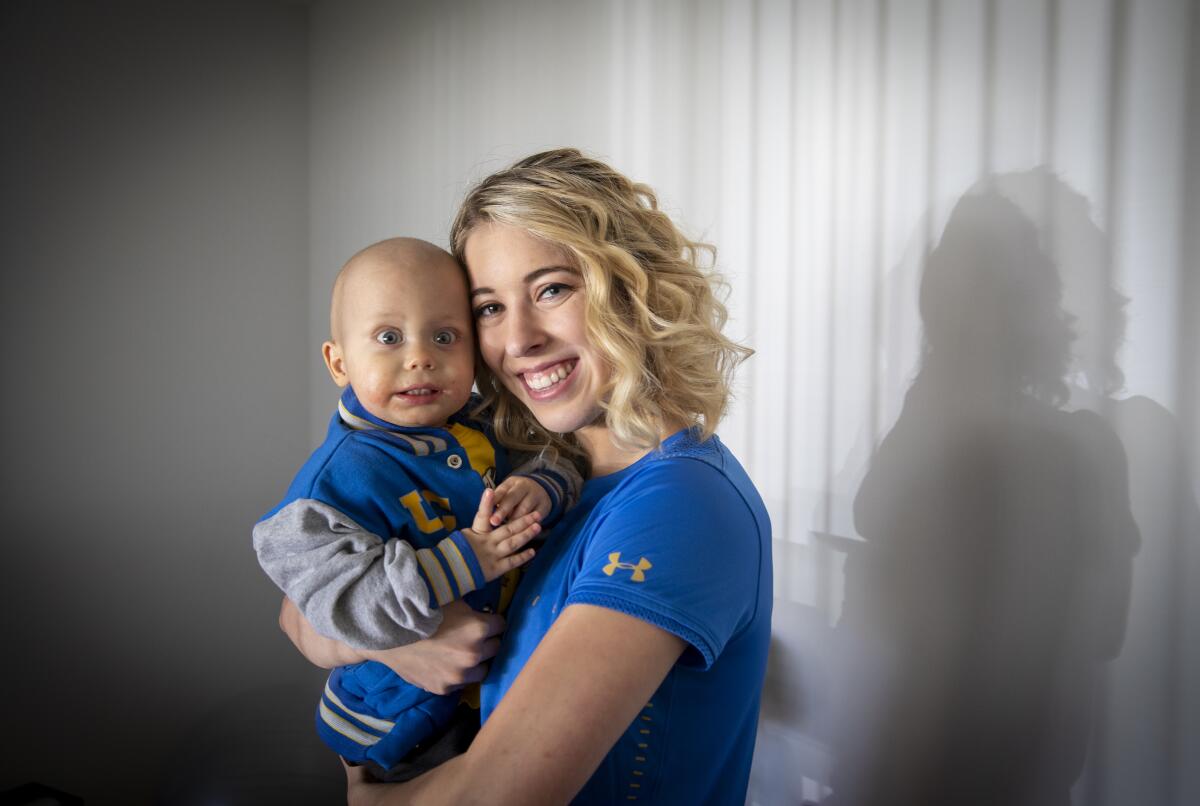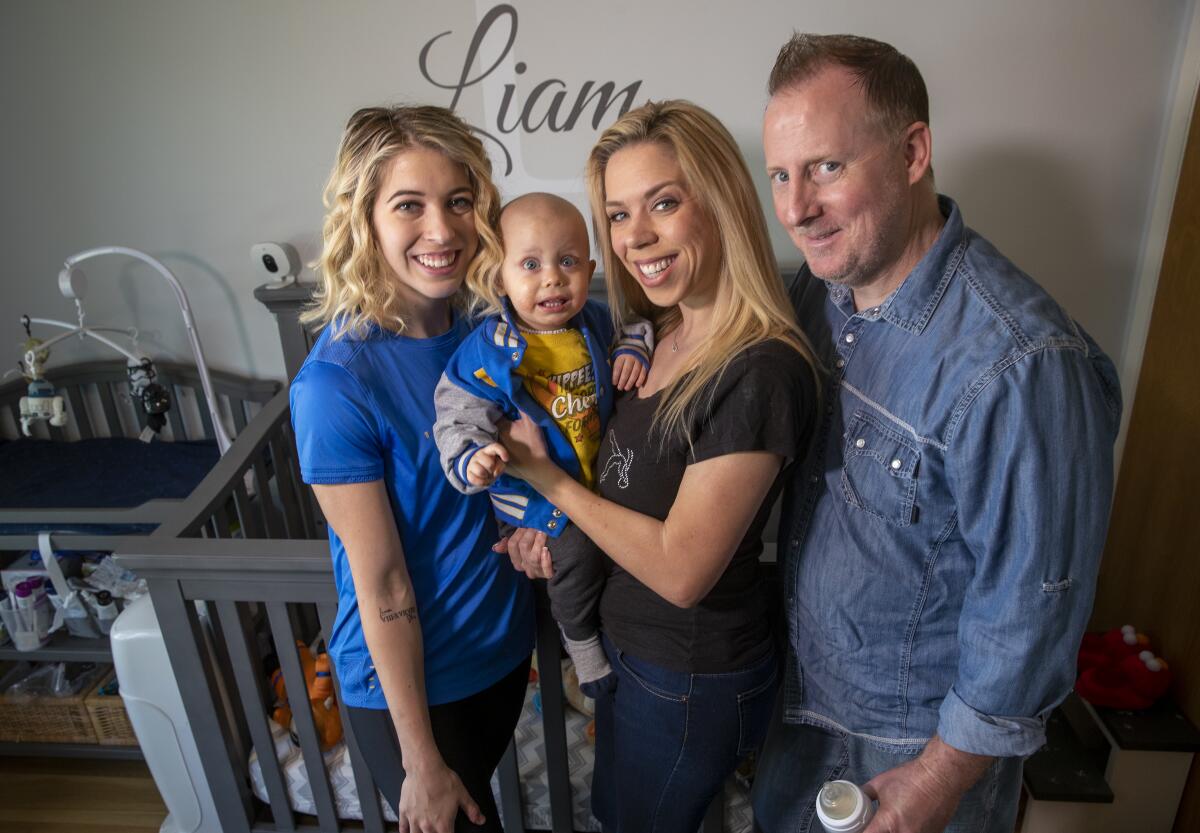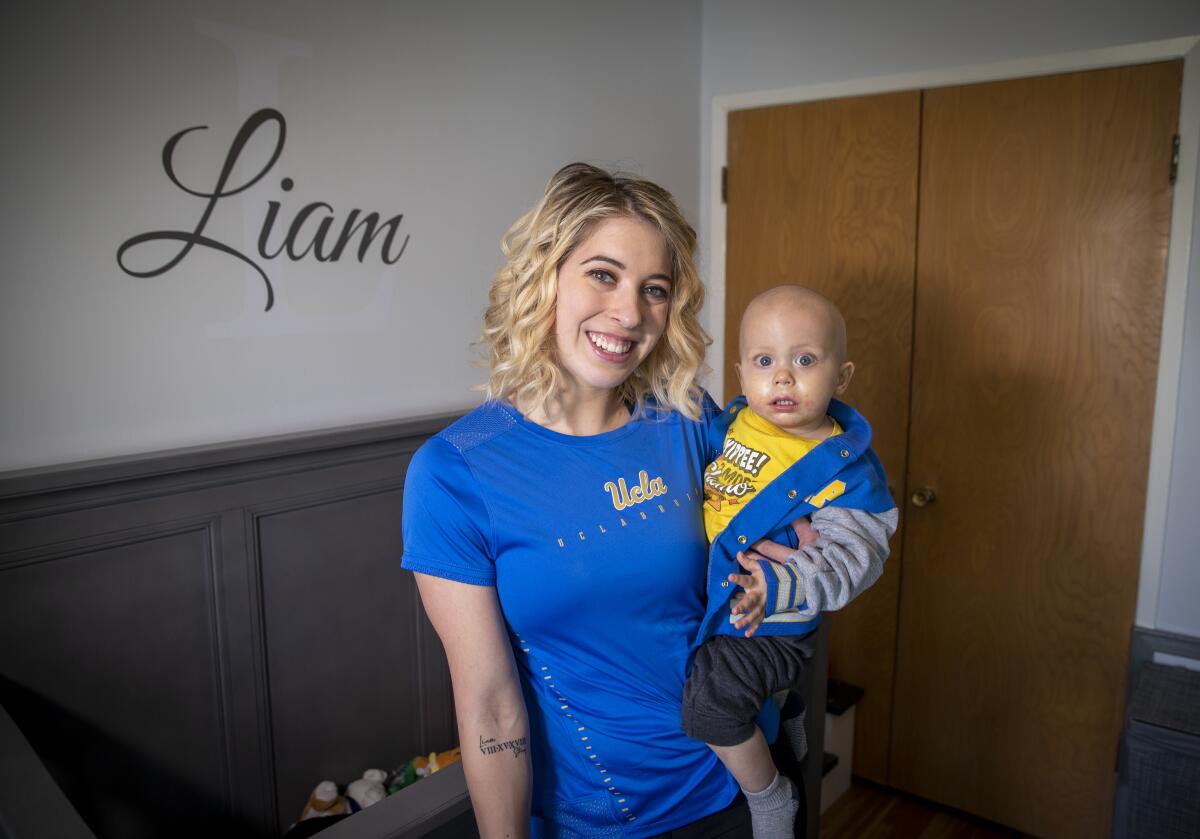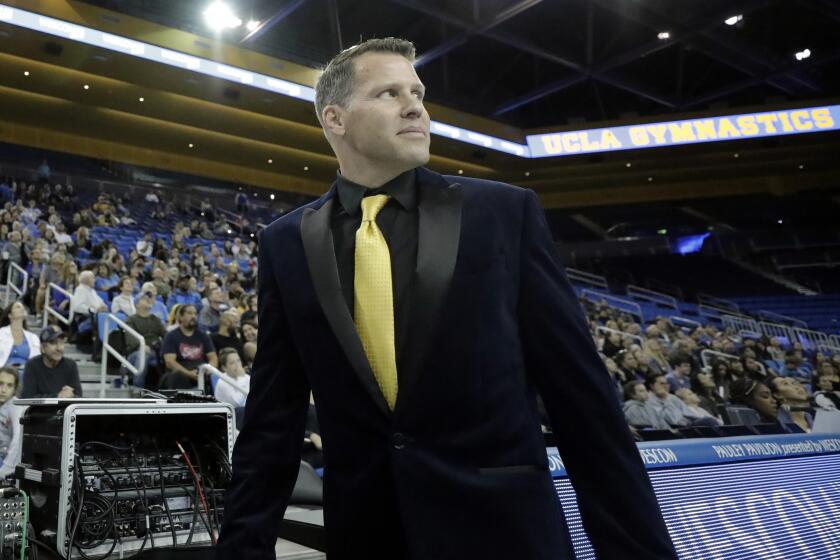UCLA gymnast Mercedez Sanchez finds inspiration in her brother’s cancer fight

- Share via
A clear plastic film covers Mercedez Sanchez’s 2-day-old tattoo. The black ink on the inside of her right forearm glistens under the florescent lights of Yates Gym. The UCLA gymnast lights up when she shows it off.
The words “Liam Strong,” penned in delicate black cursive, rest outside bold roman numerals for Aug. 15, 2018. Her brother Liam Clark was born on that date. A year later to the day, he started chemotherapy.
“It wasn’t the party that we thought it was going to be,” Sanchez says with sadness in her voice. “But the nurses all made signs for him.”
Sanchez still remembers how small Liam was when he was born, but his eyes were giant, blue and bright. Five rounds of chemotherapy later, the 18-month-old’s spirit is even livelier, and after supporting her brother through his treatment for leukemia, Sanchez is shining brighter than ever for the Bruins. The senior is challenging for one of six coveted positions in the bars lineup after three years of occasional exhibition routines.
Beyond seeing her brother live a full, happy life, earning that competition spot is her dream.
“Seeing them is really what made me raise the bar in gym and school and life,” Sanchez said of watching Liam and their mother Rosemarie deal with his illness. “No matter what treatment they’re doing, what obstacle or dip in his plan happens, it’s just finding another way.”
Inspired by Liam, who finished chemotherapy on Jan. 19 and is healing at home in Canoga Park, No. 3 UCLA will host a childhood cancer awareness meet Sunday against No. 3 Utah at Pauley Pavilion. The Bruins will encourage fans to sign up for “Be the Match,” a program that registers potential bone marrow donors and pairs them with patients in need.
Liam didn’t need a bone marrow transplant, but Sanchez and teammates like Madison Kocian have already signed up for the program. They enrolled online, took a simple cheek swab at home with a kit that came in the mail and sent the sample back. Sanchez didn’t know about the program until her brother was diagnosed three days before his first birthday.
::
Liam was very sick as a baby, Sanchez remembered. He has serious allergies and had lumps on his neck during one of his first wellness checks. Doctors advised the family that they were just swollen lymph nodes. The bumps didn’t go away. Rosemarie asked for other opinions.
When Liam had a high fever and respiratory issues that caused him to stay in a hospital, Rosemarie begged for blood work to be done. The family says it was told it was baby flu.
Liam’s oxygen level began to stabilize, and he was about to be discharged when another doctor noticed he had a black eye. The baby had suspicious red dots on his chest.
The long-awaited blood work confirmed the worst: acute myeloid leukemia. Only about 500 children in the United States are found to have AML each year, according to St. Jude Children’s Research Hospital, as it is more commonly found in adults.

Children younger than 12 months are considered high risk, although their outcomes are now comparable to older children, said Dr. Theodore Scott Nowicki, a clinical instructor at UCLA’s Department of Pediatrics, Division of Pediatric Hematology/Oncology.
The 48 hours after the diagnosis were a whirlwind of emotions and lab tests for the family. Anger that their earlier pleas for help went unanswered. Confusion of what to do next. Then hope: One of the tests revealed that the cancer hadn’t spread to Liam’s spine or brain fluid.
Three days after getting diagnosed, Liam began his first round of chemotherapy. The treatment went straight into his spine. Within days, the lumps on Liam’s neck started shrinking.
“He smiled like I hadn’t seen him smile when chemo started,” Rosemarie said. “I realized I think he’s been in pain his whole life.”
After losing both of her parents to cancer, Rosemarie was determined to face the process with conviction and positivity. She didn’t want to see it as a battle or a fight. Instead, she called it “healing.”
During rounds of chemo, Liam stayed in the hospital for up to four weeks at a time, receiving treatment for five to 10 days, then waiting for his bone marrow to regenerate his white blood cell count to strengthen his immune system. When he was strong enough, Liam and Rosemarie, who stayed with him every night and slept next to him in a hospital bed, went home for about a week before starting the process again.
When Liam was in the hospital, he didn’t leave his room. It was difficult to keep the energetic baby occupied. Mother and son walked laps around the small room. They read books. Rosemarie put on a harness and did squats with Liam strapped to her chest.

Liam liked to look out the window at a garden courtyard below, almost pressing his nose to the glass. He stared at the outside world his family hoped he soon could enjoy fully. But for more than half a year, he was limited to a room that included a bed, his playpen, a separate bathroom and a couch.
Mercedez sometimes slept on the couch.
::
Between gymnastics practices, school and meets, Sanchez drove from Westwood to Hollywood, where her brother was staying in the hospital, to see him every few days. Although she is 20 years older than her half brother, Liam is “like my best friend,” Sanchez said.
So she had no qualms about waking up with an achy back after sleeping on the hospital couch.
“Sometimes, it’s spreading myself thin,” Sanchez said, “but it’s just doing what I have to do.”
Sanchez, who hopes to pursue graduate school in sports psychology, is “the rock,” Rosemarie said. Between gymnastics and classes, Sanchez is always ready to visit her brother and give her mom a short break. “Sissy” is one of the few words Liam can say.
Sanchez is doing all this while trying to break into the bars lineup for the first time in her career. Unlike in club gymnastics, where gymnasts are guaranteed opportunities to compete in every meet, lineup spots in college are hotly contested, especially with the eight-time national champion Bruins, who regularly attract elite international recruits. To earn a competition spot on each event, gymnasts must finish in the top six of the team’s intrasquad meets during practice.
“I’m a gamer, I would say,” Sanchez said. “I love to go out in the competition and perform, so it’s just keeping that performance mind-set in practice all the time when you’re in the gym every single day.”
When she came to UCLA as a freshman, Sanchez, who competed as a Level 10 gymnast (the highest level of Junior Olympic gymnastics) and won all-around, bars, beam and floor titles at the Copa Quetzal in Guatemala in 2015, needed to improve by at least 30% to challenge for a spot, UCLA coach Chris Waller estimated. Sanchez is now closing in on the final 5%, he said.
To push into UCLA’s bars lineup, which already includes Olympic gold medalists Kyla Ross and Kocian, Sanchez needs close to a 9.85 in practice. She was at about 9.65 in November, Waller said. In an exhibition routine on Jan. 31, she scored a 9.75 and is pushing into the 9.8 range now.
“She’s just slugging away, man,” Waller said.
Sanchez has performed six exhibition routines in her career, five on bars and one on beam. Determined to make her final year at UCLA her most successful, Sanchez completely changed her offseason training program to include Olympic weightlifting. She started training last May, working three or four times a week.
At 5 feet 5 with lean legs and a shoulder-length, curly blonde bob, Sanchez caught the UCLA coaching staff’s attention as a recruit with her style and self-confidence. Even though she was not anticipated to bring immediate scores, the coaches loved her, Waller said, because she is “funny as hell” and brings joy to the team.
In training, she thrives off her flexibility, which gives her unique skills on floor, bars and beam, but never saw herself as particularly strong. Weightlifting changed that.
“Knowing that I put in the work and all this strength to be strong, it’s a different kind of confidence,” Sanchez said.
::
When Liam was getting ready for biopsies or surgeries, he couldn’t eat or be breastfed, so his older sister swooped in to read books and make him laugh. Once, before Liam went in for a procedure that included anesthesia, Sanchez and her stepfather Chris Clark were reading a dinosaur book with him.
“Rawr,” they playfully growled.
Not too long after, with Liam under anesthesia during the biopsy, he started growling too. The doctors all looked at one another. They knew they had a fighter.
“Anybody that doubted it, he shows them,” Rosemarie said. “He smiles every day, he lights up the room.”
Liam continues to pass milestones like talking and walking. He’s growing out of his clothes, and outsmarting the toys he received for his first birthday. His light blond hair is growing back. His eyelashes are short. They make his mother grin.
After 17 seasons as an assistant, Chris Waller is now in charge of the highly successful UCLA women’s gymnastics program. He expects the Bruins to be as entertaining as ever.
Rosemarie waits eagerly for the day they can go to Disneyland and Liam can meet his favorite character Mickey Mouse. She can’t wait to go to the zoo together. They’re hoping for a beach day when all their family and friends — the people who supported them through this process — can celebrate together.
But the family also knows there is a possibility of the cancer coming back. About 20% to 30% of all pediatric AML patients relapse, Nowicki said. For Mercedez, who celebrated Liam’s last day of chemotherapy by getting her tattoo, the uncertainty of her brother’s future health is sometimes overwhelming. The family is just trying to stay hopeful.
During her brief respites from the hospital, Rosemarie sometimes sat at home, sipped coffee and watched the still surface of the family pool. There were times before when she thought she maybe wanted to renovate parts of the home.
Now getting to watch Liam’s wide-eyed expression of awe as he takes wobbly toddler steps in the yard is upgrade enough.
“So many things are just perfect in life now,” Rosemarie said. “Let’s just be healthy and happy and content and enjoy it.”
More to Read
Go beyond the scoreboard
Get the latest on L.A.'s teams in the daily Sports Report newsletter.
You may occasionally receive promotional content from the Los Angeles Times.








